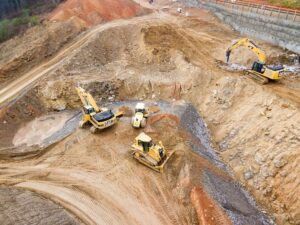Kentucky Excavation Services & Safety Best Practices
Excavation resources underpin every successful build, and knowing how earthwork resources translate into stable foundations can save time, money and rework. Contractors and project managers in Kentucky face complex soil conditions, strict permitting rules and demanding site-prep requirements. This guide delivers actionable insights on key excavation services, essential safety regulations, advanced groundwork techniques, project planning strategies, heavy equipment selection and common challenges—framed around construction resources that enhance efficiency and compliance. You will discover how mass earthwork and site preparation form the basis for lasting structures, why trenching best practices prevent costly utility strikes, which permit requirements apply locally and how precision grading and drainage systems mitigate flooding risks. Alongside these core topics, we explain how to choose the right excavation partner, estimate costs accurately and keep your timeline on track. Whether you oversee commercial developments or residential foundations, this guide equips you with authoritative knowledge and introduces Earth Works, LLC’s expertise in large-scale earth-moving operations to ensure your next project in Kentucky meets every standard.
What Are the Key Excavation Services Offered in Kentucky?
Excavation services in Kentucky encompass a spectrum of processes that transform raw land into build-ready sites. From mass earthwork that balances cut-and-fill volumes to detailed utility trenching and safe demolition, these services establish the groundwork for any structure. Integrating erosion control and onsite material screening further enhances resource efficiency and environmental compliance. Below is an overview of core excavation offerings:
Each of these services integrates heavy-duty machinery and proven techniques to accelerate timelines and improve site stability. Understanding how they interrelate prepares you for informed contractor selection and budget planning.
What Is Mass Earthwork and How Does It Support Construction?
Mass earthwork is the large-scale process of cutting, filling and balancing soil volumes to create level or sloped surfaces. By redistributing earth within the project footprint, this service minimizes haul-off costs and delivers uniform subsurface conditions. Proper mass earthwork supports structural loads, reduces long-term settlement and provides a consistent base for foundations, paving and landscaping.
How Does Site Preparation Ensure a Stable Building Foundation?
Site preparation defines a stable building foundation by combining clearing, compaction and precision grading. Removing vegetation and debris prevents future subsidence, while compaction increases soil bearing capacity. Final grading creates uniform slopes for drainage, mitigating water accumulation around footings and reducing the risk of frost heave or erosion.
What Are Best Practices for Utility Trenching and Installation?
Effective utility trenching begins with accurate subsurface utility engineering, followed by trench excavation to specified depths and widths. Shoring or sloping techniques prevent collapses, and careful backfilling with suitable bedding materials protects pipes and conduits. Strict adherence to local codes and clear marking of existing lines minimize strikes and service disruptions.
How Is Demolition Safely Conducted in Excavation Projects?
Safe demolition combines risk assessments, controlled dismantling sequences and debris management plans. Structures are deactivated for utilities, supports are removed systematically, and waste is sorted for recycling or disposal. Dust suppression and exclusion zones protect adjacent areas, while continuous monitoring ensures worker safety.
What Techniques Are Used for Efficient Land Clearing?
Efficient land clearing employs mulching heads, skid-steer attachments and selective tree removal to preserve topsoil integrity. Erosion control mats and sediment barriers prevent runoff, and onsite material screening separates reusable aggregates. These techniques expedite access and prepare sensitive sites for earth-moving operations.
What Are the Essential Excavation Safety Guidelines and Regulations in Kentucky?
Kentucky excavation safety hinges on compliance with state permits, utility-strike prevention, OSHA trenching standards and environmental regulations. A systematic approach reduces accidents, shields workers and ensures legal adherence.
- Obtain required permits from state and local agencies before excavation begins.
- Conduct pre-dig utility locates to identify underground services and prevent strikes.
- Follow OSHA and Kentucky trenching standards for protective systems in trenches over 1.2 m deep.
- Equip crews with necessary PPE and enforce regular safety training.
- Integrate environmental regulations for erosion control and sediment management.
Adhering to these guidelines not only safeguards personnel but also accelerates inspections and approvals.
What Excavation Permits Are Required in Kentucky?
Excavation permits are mandated for projects exceeding specific volumes or depths and for work near regulated waterways. State permit applications through the Kentucky Department of Environmental Protection address erosion control, while local county offices issue general excavation approvals. Securing both permits before mobilizing equipment prevents costly work stoppages.
How Can Utility Strikes Be Prevented During Excavation?
Preventing utility strikes relies on three steps: comprehensive utility mapping, daylighting existing lines before heavy-duty digging and using vacuum excavation for sensitive areas. Verification of line locations and installation of protective sleeves around services further minimize risk.
What Are the OSHA and Kentucky Trenching Safety Standards?
OSHA standards require sloping, benching, shoring or trench boxes to protect workers in excavations deeper than 1.2 m. Kentucky regulations align with federal rules but may impose additional training requirements and inspection intervals. Daily trench inspections by a competent person ensure protective measures remain effective.
Which Personal Protective Equipment (PPE) Is Necessary for Excavation Work?
Excavation crews must wear hard hats, high-visibility vests, steel-toe boots and protective gloves. In airborne dust or confined spaces, respirators and eye protection become essential. Reflective clothing and hearing protection enhance safety around heavy machinery.
How Do Environmental Regulations Impact Earthworks in Kentucky?
Environmental regulations govern sediment runoff, wetland proximity and soil disposal. Kentucky’s Department of Environmental Protection requires erosion control plans, including silt fences and sediment basins. Compliance minimizes permit violations and preserves local waterways during mass earthwork and land clearing.
How Do Groundwork Solutions and Techniques Improve Excavation Outcomes?
Advanced groundwork solutions such as soil stabilization, drainage systems and retaining walls enhance site resilience and reduce maintenance costs. Precision grading further optimizes load distribution and surface runoff control.
Integrating these techniques during the early site preparation phase ensures that subsequent construction phases proceed without geotechnical setbacks or water-related disruptions.
What Are the Most Effective Soil Stabilization Methods?
Effective soil stabilization mixes binders—such as lime, cement or high-binder mixtures—directly into native soils. This reaction improves shear strength, reduces plasticity and controls moisture sensitivity. Mechanical mixing and compaction complete the process, producing a stable subgrade for pavements and foundations.
How Is Drainage System Installation Performed to Prevent Flooding?
Drainage installation begins with survey-driven layout of sub-surface pipes or surface swales. Trenches are excavated to precise slopes, gravel bedding is placed for filtration and perforated pipes channel water to designated outlets. Backfilling and final grading ensure erosion-free discharge and long-term functionality.
What Are the Best Practices for Building Durable Retaining Walls?
Durable retaining walls require proper footing excavation, geogrid reinforcement and adequate drainage behind the wall face. Segmental block walls benefit from interlocking features, while poured concrete walls incorporate weep holes to relieve hydrostatic pressure. Adhering to design specifications prevents bulging and settlement.
How Does Precision Grading and Levelling Enhance Site Stability?
Precision grading employs laser-guided equipment to achieve uniform elevations within millimeter tolerances. This technique optimizes load transfer, avoids water pooling and accelerates foundation placement. Consistent grading also reduces material waste and rework during finishing stages.
How Should You Plan and Manage Excavation Projects in Kentucky?
Planning rigorously and managing resources effectively underpins project success. A structured approach involves contractor selection, accurate cost estimation, timeline control and comprehensive site assessments.
- Define scope and objectives to align excavation services with project requirements.
- Evaluate contractor credentials including equipment fleet and local compliance record.
- Develop detailed cost models that account for soil conditions, haul distances and labor rates.
- Establish realistic timelines with buffer allowances for weather and permitting.
- Conduct pre-construction site assessments to identify subsurface risks and logistical constraints.
This framework promotes transparent decision-making and helps you maintain budget compliance while minimizing delays.
How Do You Choose the Right Excavation Contractor?
Selecting an excavation contractor involves assessing specialized equipment availability, safety track record and local regulatory expertise. Review past project performance, verify insurance coverage and confirm familiarity with Kentucky permitting processes to ensure a seamless collaboration.
What Are Accurate Cost Estimation Methods for Excavation Services?
Accurate cost estimation combines unit-rate analysis—covering excavation depth, hauling distance and backfill volumes—with historical data from similar projects. Factoring in soil classification reports and seasonal labor price fluctuations refines budget forecasts and prevents overruns.
How Can Project Timelines Be Effectively Managed?
Timelines are managed by sequencing mass earthwork, utility trenching and groundwork in logical phases. Daily progress tracking, proactive permit renewals and contingency planning for weather interruptions keep the schedule on track.
What Is Included in a Pre-Construction Site Assessment Checklist?
A pre-construction site assessment checklist reviews soil borings, utility locate records, drainage patterns and environmental constraints. Identifying potential rock, groundwater or endangered species concerns at this stage reduces costly surprises during excavation.
What Heavy Equipment Is Commonly Used in Excavation and How Does It Improve Efficiency?
Heavy equipment selection drives productivity and precision on excavation projects. The right machinery reduces cycle times, enhances safety and lowers operational costs.
- Excavators, backhoes and bulldozers for bulk earth-moving and trenching tasks.
- Graders for fine grading and levelling operations.
- Compactors and rollers to achieve specified soil density and compaction.
- Loaders and dump trucks for material handling and transport.
- Specialty attachments—such as hydraulic hammers and shears—for demolition work.
What Are the Roles of Excavators, Bulldozers, and Backhoes?
Excavators provide deep digging capacity and reach, bulldozers push large volumes of soil efficiently and backhoes combine trenching versatility with loader functions. Together, they form a coordinated fleet that tackles grading, trenching and material movement seamlessly.
How Do Graders Contribute to Site Preparation and Grading?
Graders use adjustable blades and laser-guided controls to achieve uniform slopes and precise finish grades. Their ability to finely tune elevations ensures proper drainage and a level platform for foundations and paving.
What Safety Measures Are Required When Operating Heavy Equipment?
Operating heavy equipment safely demands trained operators, regular maintenance inspections and strict adherence to manufacturer load-limit guidelines. Clear communication protocols, use of spotters and implementation of rollover protection systems further mitigate onsite risks.
What Are Common Excavation Challenges and How Does Earth Works, LLC Provide Solutions?
Excavation projects often confront unstable soils, drainage complications and budget constraints. Earth Works, LLC leverages advanced techniques and equipment to address these issues efficiently.
- Poor soil conditions are managed through on-site soil stabilization and material screening.
- Excess surface or sub-surface water is handled with custom drainage solutions and dewatering pumps.
- Budget and schedule pressures are mitigated by precise mass earthwork planning and phased mobilizations.
How Is Poor Soil Condition Addressed Through Soil Stabilization?
Earth Works, LLC conducts soil analysis and applies lime or cement stabilizers mixed mechanically into native ground. This process elevates load-bearing capacity and controls moisture-driven volume changes, delivering a reliable subgrade for foundations and pavements.
What Solutions Are Available for Drainage Issues on Construction Sites?
Custom drainage solutions include installation of French drains, channel catch basins and geotextile-lined swales. These systems divert water effectively, prevent surface ponding and protect excavation faces from erosion.
How Does Earth Works, LLC Ensure Project Efficiency and Budget Compliance?
By integrating precision grading technology, real-time volume tracking and phased earth-moving schedules, Earth Works, LLC optimizes resource allocation. Transparent reporting and proactive change-order management maintain budget integrity and client confidence.
What Are Frequently Asked Questions About Excavation Services in Kentucky?
What Types of Excavation Require Permits in Kentucky?
Major earth-moving activities—such as deep trenching, mass cut-and-fill operations and work near regulated waterways—all necessitate state or local permits to ensure environmental and public safety standards are met.
How Much Does Excavation Cost in Kentucky?
Excavation costs typically range based on soil type, depth, project scale and access. Unit rates per cubic meter, haul distances and compaction requirements form the basis of comprehensive cost estimates.
What Are the Best Practices for Excavation Safety?
Best practices include verifying underground services before digging, using protective systems for trenches, conducting daily inspections by a competent person and providing appropriate personal protective equipment.
How Do Excavation Services Support Urban Development?
Excavation services create the substructure for roads, utilities, building foundations and public spaces. Proper earthwork accelerates urban infrastructure projects and supports sustainable growth.
What Equipment Is Used by Excavation Contractors?
Contractors rely on excavators, bulldozers, graders, compactors and specialized attachments—such as shears and hydraulic breakers—to perform tasks ranging from site clearing to complex trenching.
A well-executed excavation plan combines technical precision, regulatory compliance and resource efficiency. By mastering these core concepts—from mass earthwork and safety regulations to advanced groundwork techniques and equipment optimization—you can deliver robust foundations and smooth project delivery across Kentucky. Engage with Earth Works, LLC’s team at kyearthworks.com to explore tailored excavation strategies, request a detailed site assessment and secure expert support for your next civil works endeavor.


